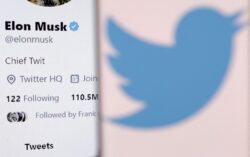Mastodon gained more than 70,000 new sign-ups on Friday, after Musk’s takeover of Twitter was complete (Picture: Reuters)
It turns out, not many people are a fan of using Elon Musk’s version of Twitter, abandoning the bird app for greener pastures.
Among the ones fleeing Musk’s $8 a month Twitter blue checkmark charge, Mastodon seems to be a popular alternative.
Mastodon is a decentralised social network launched in 2017 for Twitter users sick of the abuse and hatred on the platform.
The app is currently catching up to social media giants and is currently number 10 on Apple’s App Store and number 11 on Google’s Play Store.`
The social media app gained more than 70,000 new sign-ups on Friday, after Musk’s takeover of Twitter was complete.
Over the weekend, the official Mastodon mobile app saw a record number of downloads.
What is Mastodon?
Mastodon is like Twitter, but with a 500-character limit on ‘toots’ (their version of tweets), and you can also set posts to private (something Twitter lacks).
Unlike Twitter, it’s not a single website but a network of users in independent communities that can set up their own guidelines.
It has all your standard Twitter features like Explore, Notifications, Dark Mode, Sharing and Musk’s favourite one — Polls.
However, Mastodon’s feed is quite different from Twitter with its chronological, ad-free, and non-algorithmic approach.
Content warnings let you hide posts containing sensitive or triggering material until you’re ready to engage with them and each community has its own guidelines and moderators.
The company is registered as a nonprofit and development is supported entirely by donations which means there’s no advertising or monetising your attention and the makers want ‘to keep it that way’.
The open-source social network capitalised on the Musk-Twitter drama earlier this year and launched a free Android app in addition to its iPhone app, web version, and several third-party services.
Mastodon is currently populated by a devoted base of left-leaning niche communities and its code of conduct prohibits a broad range of bigotry. That should be a stark difference from Musk’s Twitter where he intends to ensure absolute free speech, even if it’s hate speech.
One thing’s for sure; the search for the internet’s next favourite hangout is on and a decentralised social media platform not owned by a billionaire sure sounds good.
People are choosing ‘toots’ over tweets.





